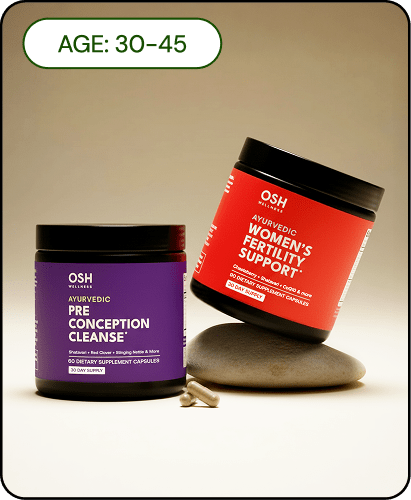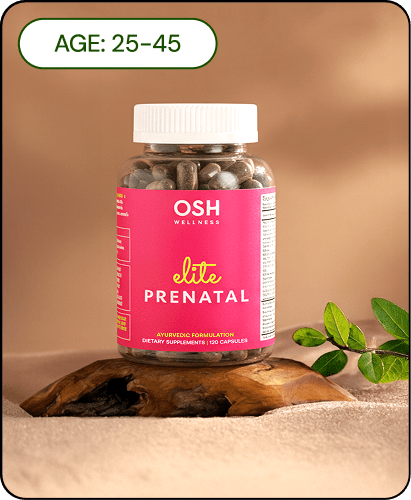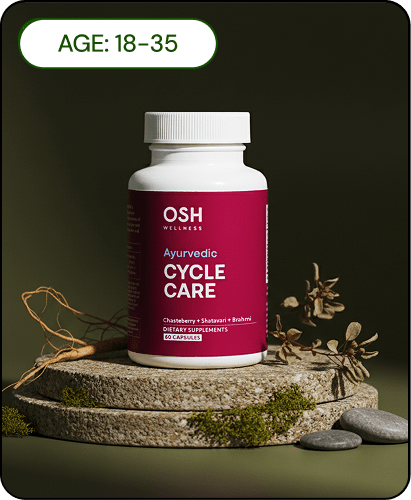Table of contents
Menopause represents a pivotal transition in a woman's life, often accompanied by a spectrum of physical and emotional challenges. This article explores Ayurveda for menopause, highlighting its time-tested, holistic approach to easing symptoms with natural remedies tailored to individual needs. By balancing body energies and emphasizing herbal treatments, dietary modifications, and lifestyle changes, Ayurveda offers a comprehensive framework to enhance quality of life during this significant life stage.
Understanding Menopause and Its Challenges

Menopause is a transformational biological phase in a woman's life, involving the gradual decline of estrogen and progesterone as the ovaries cease to produce eggs. This transition typically unfolds across three stages:
Perimenopause: Often begins in the mid-to-late 40s, bringing irregular periods and hormone-driven symptoms.
Menopause: Defined as 12 consecutive months without menstruation.
Postmenopause: Follows menopause, when hormonal levels stabilize, though symptoms may persist.
Common symptoms include hot flashes, night sweats, disrupted sleep, and fatigue. Emotionally, many women report mood swings, anxiety, or a sense of loss related to fertility. These experiences can impact daily life for up to 7 to 10 years [1].
Management strategies vary and may include:
Regular exercise
Balanced nutrition
Stress-reduction techniques
Hormone Replacement Therapy (HRT), when appropriate
Non-hormonal alternatives such as herbal remedies
The Principles of Ayurveda

Ayurveda, the ancient Indian system of medicine, rests on the principle that optimal health is achieved through harmony between the mind, body, and spirit. A central concept includes the three doshas: Vata (air and ether), Pitta (fire and water), and Kapha (earth and water) [4]. Each person has a unique combination of these doshas or prakriti, which governs their health tendencies.
During menopause, these doshas can easily become imbalanced :
Excess Vata may lead to anxiety, dryness, and insomnia
Elevated Pitta might trigger irritability, hot flashes, or inflammation
Ayurvedic management of menopause includes:
Warm, nourishing foods for Vata balance
Cooling foods and calming practices for Pitta
Customized herbal support and mindful lifestyle changes
This mind-body emphasis enables a smoother transition through menopause and supports long-term wellness [5][6] .
Ayurvedic Herbs for Menopausal Relief

Ayurveda offers numerous herbs known for their ability to ease menopausal symptoms. Notably:
Shatavari (Asparagus racemosus: A 2024 clinical trial found it significantly alleviates hot flashes and night sweats compared to placebo [7] .
Ashwagandha (Withania somnifera): Known for reducing stress and improving sleep. Though human trials specific to menopause are limited, animal studies support its adaptogenic effects [9].
Ashoka (Saraca asoca): Contains plant-based estrogens to help regulate hormone levels [10].
Combined with Ayurvedic practices like yoga, massage, and diet correction, these herbs provide a gentle yet effective method for improving a woman's quality of life during menopause [8].
Dietary Adjustments in Ayurveda

Diet forms the cornerstone of Ayurvedic support for menopause. It integrates key nutrients to maintain hormonal balance and overall vitality.
Key dietary considerations include:
Phytoestrogens: Found in soybeans, flax seeds, chickpeas, apples, and pomegranates. These mimic estrogen and help reduce vasomotor symptoms [11].
Calcium & Proteins: Dairy, lentils, leafy greens, and seeds protect against bone loss and muscle degeneration [12][13] .
Healthy Fats: Omega-3-rich foods like ghee and flaxseed improve cardiovascular and joint health.
Digestive Spices: Ginger, turmeric, and cumin enhance metabolism and nutrient absorption [14].
By adopting these Ayurvedic food principles, women can manage symptoms more effectively while securing long-term wellness.
Mind-Body Practices: Yoga and Meditation

Yoga and meditation offer a holistic toolset for managing menopausal symptoms. Clinical trials show that restorative yoga poses can significantly reduce hot flashes and night sweats [15] .
Psychological benefits include...
Decreased anxiety and depression
Improved sleep and emotional stability
Reduced severity of mood-related symptoms on the Menopause Rating Scale [16]
Simple daily routines may include:
15-30 minute restorative yoga sessions
Cooling pranayama practices
Mindfulness or breathing-focused meditation
When combined with Ayurvedic lifestyle and dietary practices, yoga and meditation offer deep mind-body integration for women at this life stage [17][18] .
The Future of Ayurvedic Practices in Menopause Management

The future of menopause care increasingly leans toward integrative medicine. Ayurvedic perspectives see menopause (Rajonivritti) as a natural doshic imbalance, primarily in Vata and Pitta energies [7].
Recent evidence supports the efficacy of Ayurvedic treatments:
A 2024 clinical trial showed a Shatavari root extract effectively relieved menopausal symptoms compared to placebo [9].
Satavari Yoga, a preparation combining Shatavari with ghee and honey, significantly improved psychological symptoms [19].
Despite some limitations in managing urogenital symptoms, these findings promote Ayurveda as a viable partner to modern medical interventions. Personalized care plans that integrate conventional and Ayurvedic methods are poised to deliver better outcomes for menopausal women [20].
Relevant Products
Osh Wellness offers a curated range of Ayurvedic products targeting menopause-related concerns. Their formulations include herbal supplements like Hormone & Mood Support designed to promote relaxation, hormonal harmony, and emotional well-being. These natural products combine traditional wisdom with modern wellness innovation.
Conclusions

Ayurveda delivers a thoughtful, personalized approach to menopause management. Through its rich combination of lifestyle alterations, herbal support, and dietary balance, it supports women in navigating this life transition with strength and serenity. Embracing this tradition empowers women not only to alleviate symptoms but also to thrive during their menopausal journey.
FAQs
What are the most effective Ayurvedic herbs for menopause?
Shatavari and Ashwagandha are two of the most commonly recommended herbs, offering hormonal support and stress relief respectively.
Can you combine Ayurvedic practices with conventional treatments?
Yes, integrative approaches combining Ayurveda with modern medicine are increasingly supported by research.
How do lifestyle changes impact menopausal symptoms?
Mindful lifestyle changes, including diet, exercise, and stress management, greatly reduce symptom severity and improve quality of life.
What basic dietary changes should one consider during menopause?
Focus on phytoestrogens, calcium-rich foods, and anti-inflammatory spices, while avoiding processed and overly spicy foods.
Sources
1: Cleveland Clinic - Menopause Stages
2: Mayo Clinic - Explaining the Stages of Menopause
3: Summa Health - Understanding Signs and Symptoms of Menopause
4: Kerala Ayurveda - The Doshas Explained
5: Banyan Botanicals - Vata, Pitta, and Kapha
6: Healthline - Understanding the Doshas
7: JAIMS - Ayurvedic Management of Menopause
8: TerMedia - Systematic Review on Ayurvedic Interventions
9: PubMed - Efficacy of Shatavari Root Extract
10: LifeSpa - Best Ayurvedic Herbs for Menopause
11: Dr. Sharda Ayurveda - Diet for Menopause
12: Adyanta Ayurveda - Menopause Treatment
13: Banyan Botanicals - Menopause Guide
14: Planet Ayurveda - Diet Chart
15 : International Menopause Society - Yoga for Menopausal Symptoms
16: Online Menopause Centre - Yoga Benefits
17: Art of Living Retreat Center - Yoga for Menopause
18: Purely Planted - Yoga and Menopause
19: LWW - Clinical Study of Satavari Yoga
20: IJAM - Integrating Ayurveda for Menopause Management







